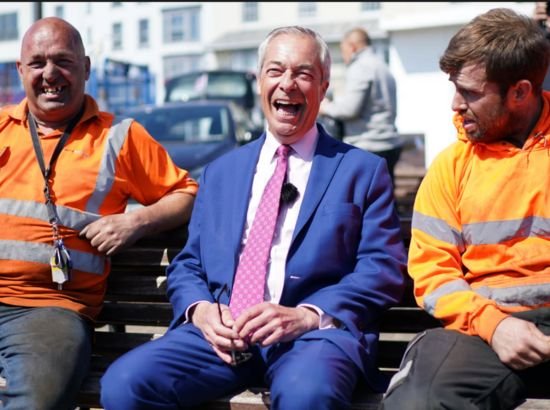
Nigel Farage has been branded a “political fraud” who is pretending to champion working-class values simply to attract votes ahead of the upcoming local elections, according to a leading union figure.
Paul Nowak, head of the Trades Union Congress (TUC), sharply criticized the Reform UK leader, highlighting contradictions in Farage’s stances on workers’ rights, the economy, industry, and Brexit. He cautioned voters against being misled by Farage’s populist messaging, warning that the party lacks real solutions to the country’s problems.
As Reform UK prepares to make gains across post-industrial regions in the Midlands and North of England, Nowak acknowledged widespread frustration with mainstream politics. However, he stressed that supporting Farage’s movement would not bring the meaningful change many voters are seeking.
He urged Labour leader Keir Starmer to resist any temptation to shift rightwards in response to potential Reform victories, emphasizing that Labour’s parliamentary majority should be used to deliver real change, not imitate right-wing populism.
In recent weeks, Farage has adopted traditionally left-wing rhetoric, calling for the nationalization of British Steel and failed water companies, and courting trade union support. He even delivered a speech in County Durham — a symbolic area for the labour movement — pledging to “reindustrialize Britain.”
Nowak, however, warned voters not to be fooled. “There’s no bandwagon he won’t jump on if he thinks it will win votes,” he said. “People need to look beyond his words and focus on his actions, which have consistently gone against the interests of working people.”
He described Farage as a public school-educated ex-trader posing as a working-class hero, pointing out major inconsistencies between Farage’s promises and his track record.
The union leader highlighted Farage’s role in Brexit, which he said inflicted lasting damage on the UK economy, particularly in manufacturing and engineering. He also criticized Farage’s support for Donald Trump’s tariffs, which have threatened British manufacturing jobs.
Furthermore, Nowak pointed out Reform UK’s opposition to the Employment Rights Bill, despite the bill’s popularity even among Reform voters. The proposed legislation includes stronger protections for sick pay, parental leave, and flexible working rights.
“He’s never managed a council or even a parish council,” Nowak added. “Farage has spent his career criticizing others for riding the political gravy train while doing exactly the same.”
Nowak also expressed concern about Farage’s past use of inflammatory rhetoric around immigration and Brexit. He suggested that Farage’s comments had at times stoked division and fueled social tensions.
However, he distanced himself from labeling all Reform UK supporters as racist, acknowledging that while there are “racist elements” within the party, most of its voters are not motivated by racism.
Instead, he criticized Farage’s broader approach to migration and international relations, arguing that closer cooperation with Europe is essential for the UK’s economic future.
In his final message, Nowak cautioned Starmer against trying to “out-Reform Reform” by shifting Labour to the right. He insisted that focusing on public services, workers’ rights, a robust industrial strategy, and tackling the cost of living crisis would be the best way to win lasting support — and to silence right-wing populists.
“With a majority of over 170 seats, there’s no reason for a crisis of confidence,” he said. “Labour must deliver the change it promised — that’s how we defeat Farage and the populist right.”
In response, a Reform UK spokesperson claimed that workers were leaving traditional unions to join their movement, suggesting that Nowak’s criticism reflected growing frustration within the labour establishment.